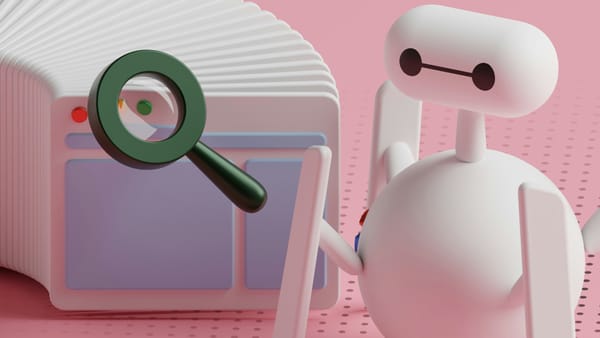In Ruska, Tesla charge you - The Lagrange Point Vol. I, Iss. 4.
I'm quite happy with the Ruska miniatures, even if they cost me an arm and a leg and are now, sadly, defunct. They represent a tantalizing "what might have been" for Rivet Wars.

Welcome to the fourth issue of The Lagrange Point! If you aren't familiar with this budding e-newsletter, you can find out more in this post here.
In This Issue
Distant Early Warnings
- Remember Siege, where you shot at castles? That, but dinosaurs.
Crafter's Corner
- Rivet Wars - Ruska Heroes
Rantables
- Lies, damned lies, and the Crime Severity Index
And Lastly, A Word
- The worthier lesson of A Series of Unfortunate Events
Distant Early Warnings
Upcoming releases and events of Canadian geek things
The summer is a quieter time for geeky Canadian things, but I've still dug up some interesting releases to consider...
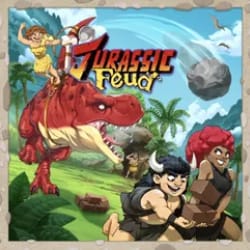
Halifax-based Vesuvius Games has a Kickstarter campaign on the go for their new game, Jurassic Feud. This is definitely giving me flashbacks to 1994's Siege. It looks a lot more structured than that 30-year-old game (oof just felt that in my bones), but it does my heart good to see that kids still get to shoot plastic balls at each other.
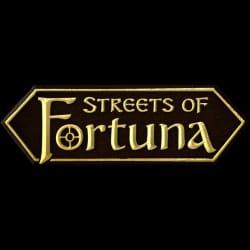
I'm a bit behind on this entry and the next one. First up, we have Sreets of Fortuna, the newest upcoming game from Kitfox, the Montreal-based studio behind Boyfriend Dungeon. Streets of Fortuna was announced in June, and looks like a tremendously ambitious undertaking for the indie studio, pitched as a "megasim sandbox RPG with emergent chaos rather than a linear story."
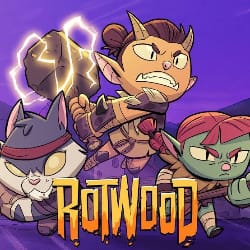
I'm usually up on what Klei Entertainment is up to in Vancouver, as I'm a huge fan of Don't Starve and Invisible Inc., but I missed that they quietly moved their new title, Rotwood, into Early Access. The art style looks in line with Klei's previous titles, which has been a big plus for me, but I'm not sure about the gameplay yet, which is a dungeon crawler co-op. Some players are saying it is in keeping with Klei's propensity for difficulty, and while I liked that in Invisible Inc., my old man reflexes are too slow for dungeons.

Lastly, I'll quickly highlight that if you're in Montreal, it's Otakuthon this coming weekend, August 2 to 4. The largest anime convention in Montreal is boasting a ton of cool events like live concerts (including one for the music of Final Fantasy!) and some serious anime royalty, with Saki Fujita (Hatsune Miku), Yuriko Yamaguchi (Nico Robin) and Toshio Furukawa (Piccolo) making appearances.
Crafter's Corner
Rivet Wars Ruska - Hero Figures
At long last, I got my Ruska heroes painted up.
If you missed out on the first issue of The Lagrange Point, you likewise would have missed the background info on what these guys are. By way of a quick version, the Ruska come from a game called Rivet Wars, were never "formally" released (only made-to-order through Shapeways), and I am willing to bet I have the only properly based, and now painted, army of the faction.
First up, we have Korporal Ursus.
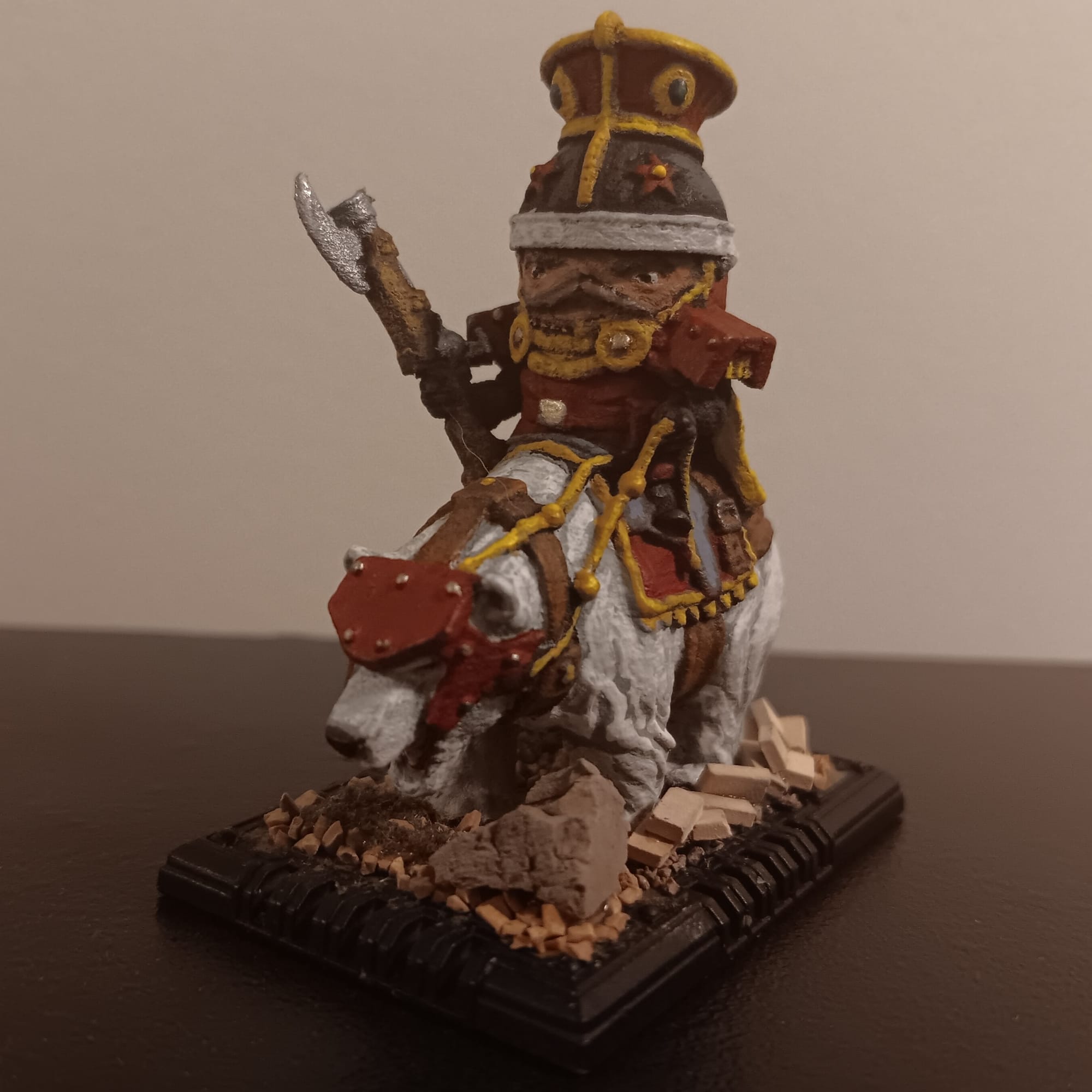
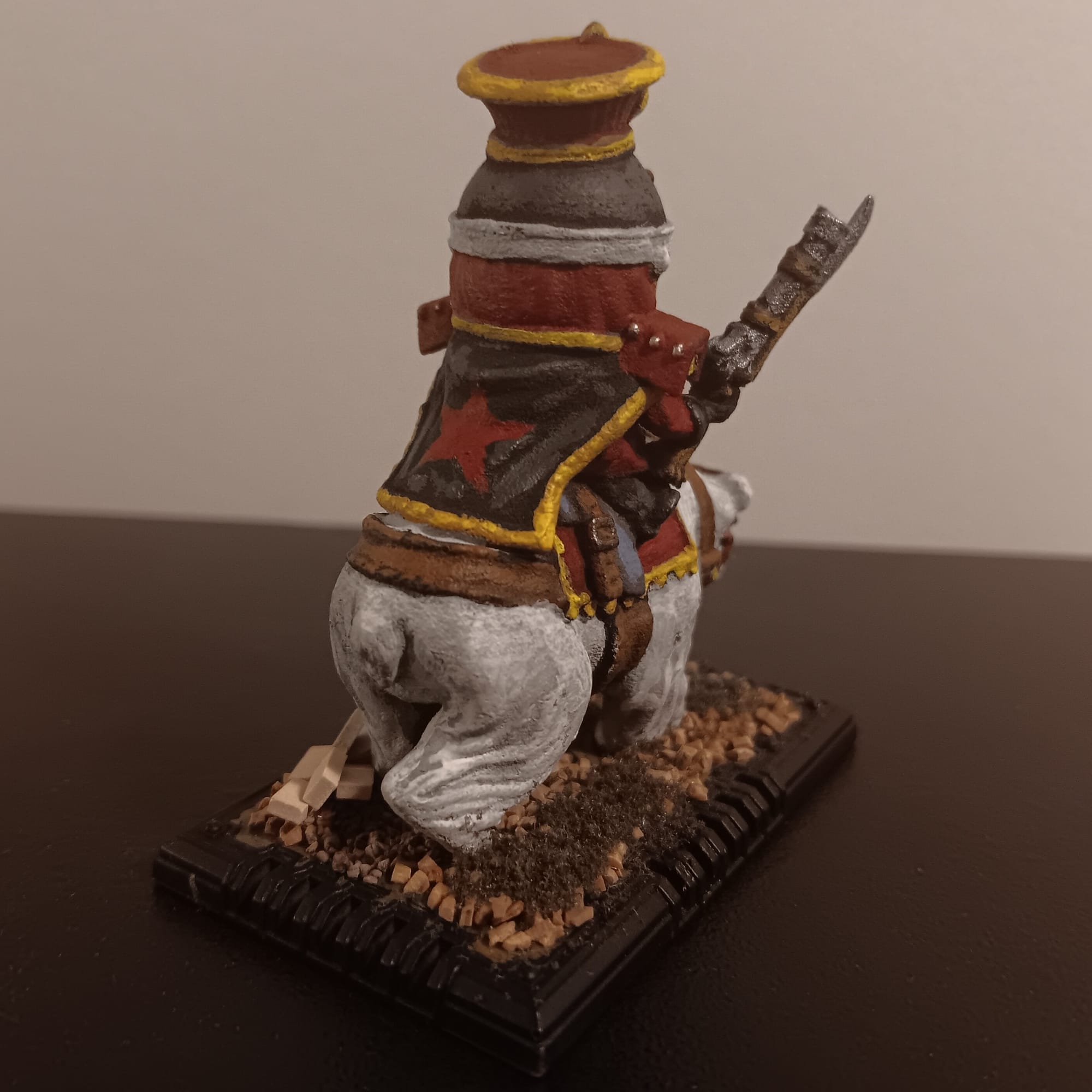
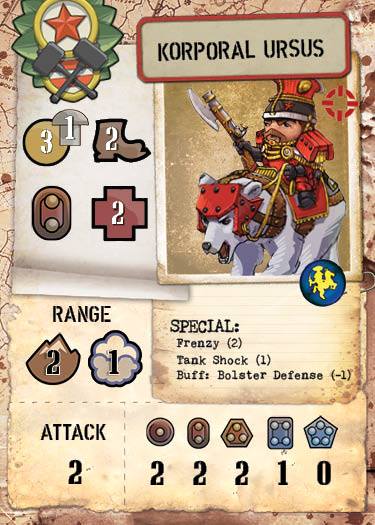
I'll mention here that these were single-pose, single-part miniatures, not multi-part kits, by wait of explaining how some of the detail is a bit meh (the skin folds on the bear are wonky to me). I also have to say that his hat kinda weirds me out; the gemstones and stars align with his face, so it looks like he has three sets of eyes or something.
Nevertheless, I think he turned out pretty well. I free-handed a red star onto his cape to give him a bit more fanciness, too. Next, we have the KV-12 tank.
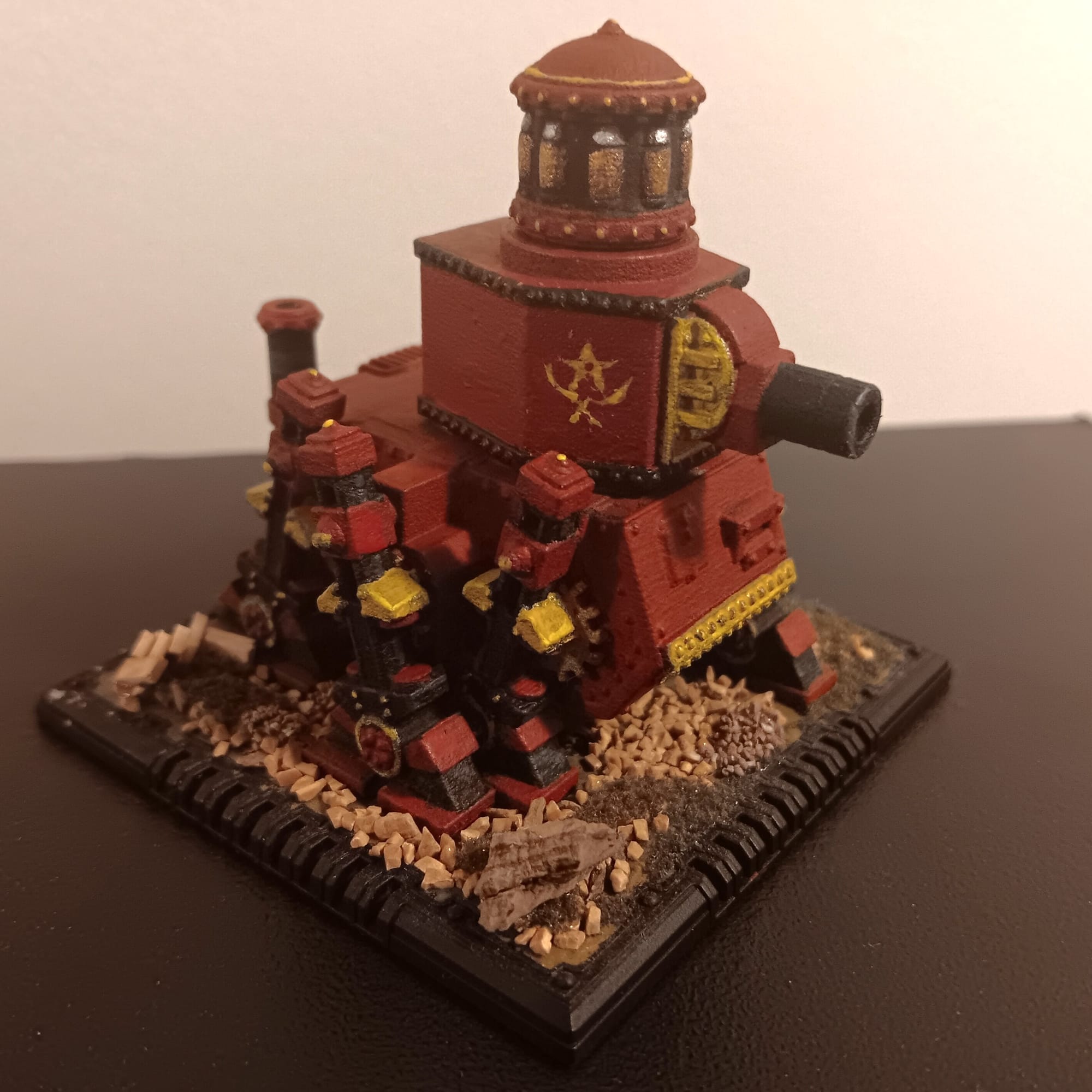
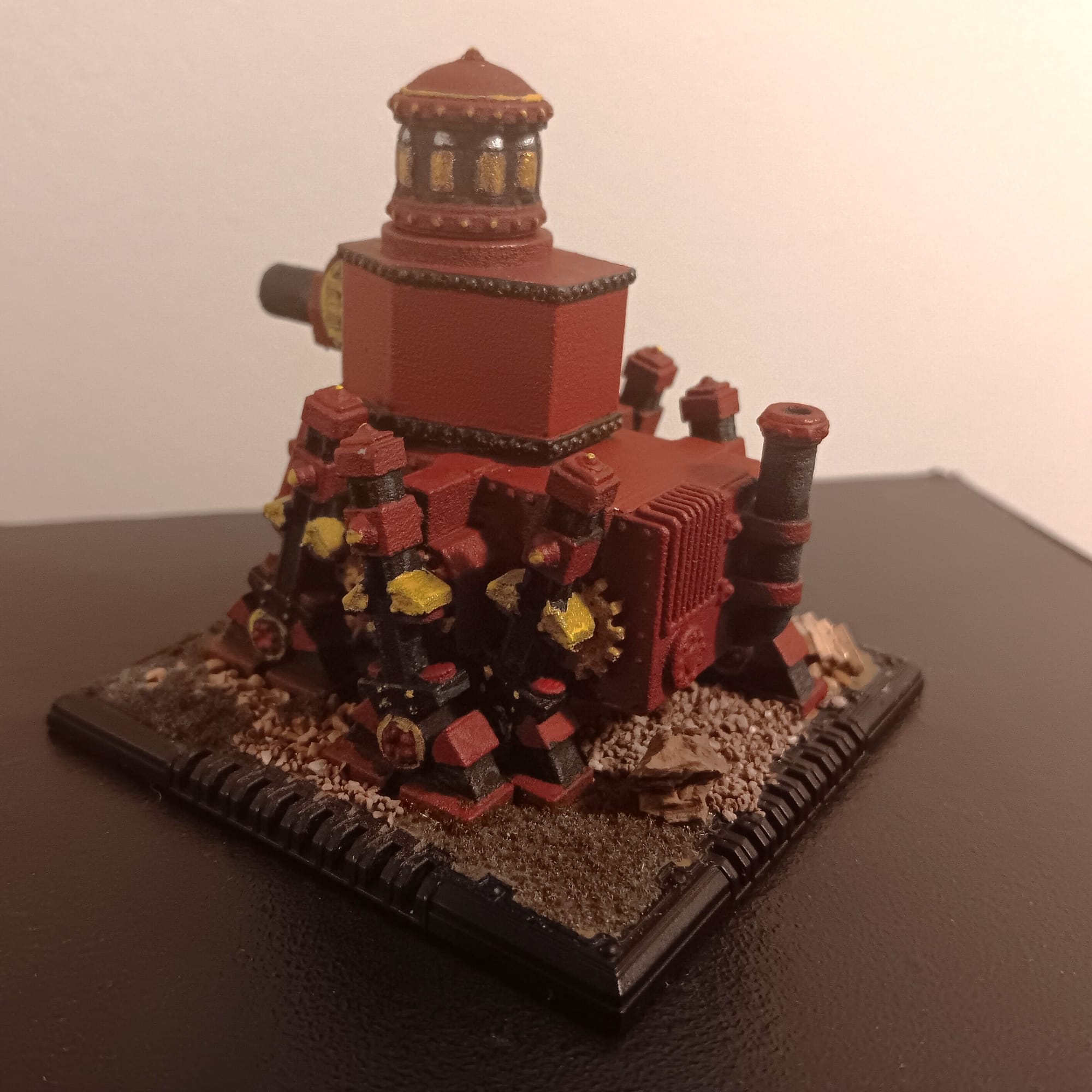
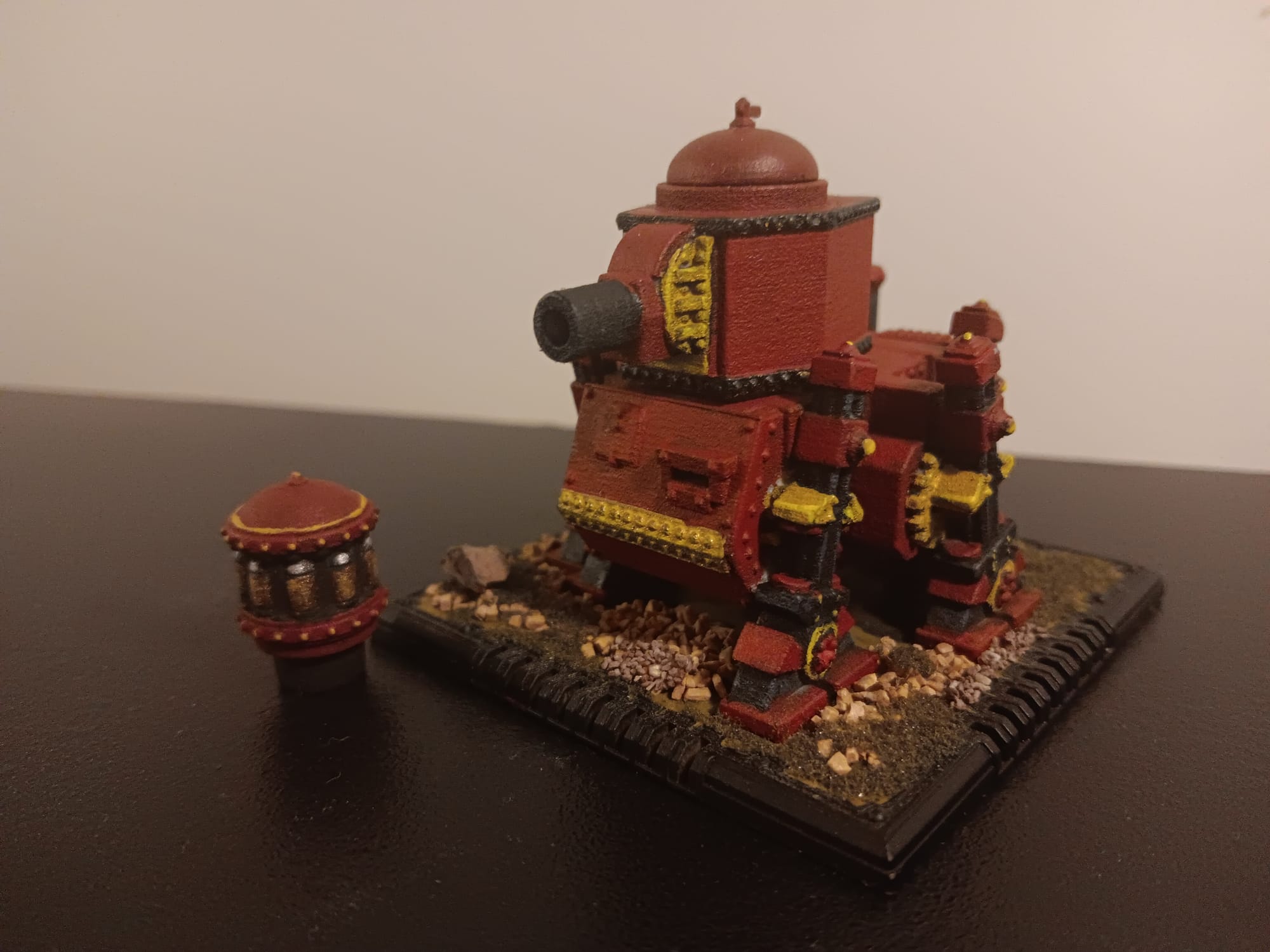
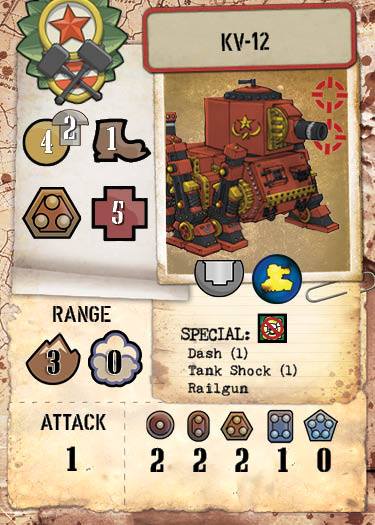
I free-handed on the yellow star with sickles to better match the art on the stat card and to give it some decoration. I might add a spare number decal to one of the other bare sides later.
I've posed the KV-12 here with the optional Tungsten Loader plug. The "plug" system in Rivet Wars basically functions as add-ons to select units. Because the Ruska had a very limited army list and were never fully released, the only "pluggable" unit they have is the KV-12, and the only plug they have is the Tungsten Loader. Other armies often have "plug" versions of hero units.
That brings us to Tesla.
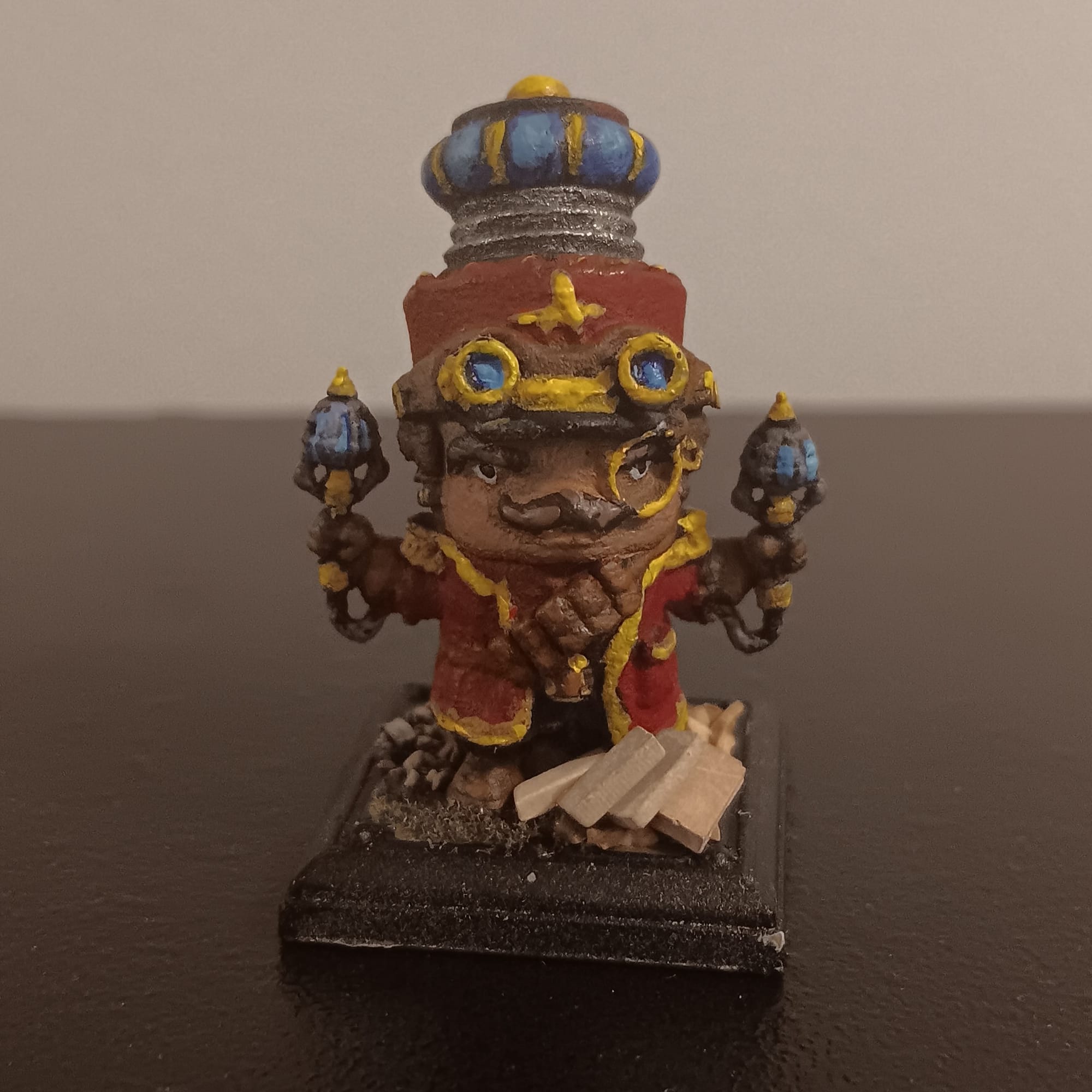
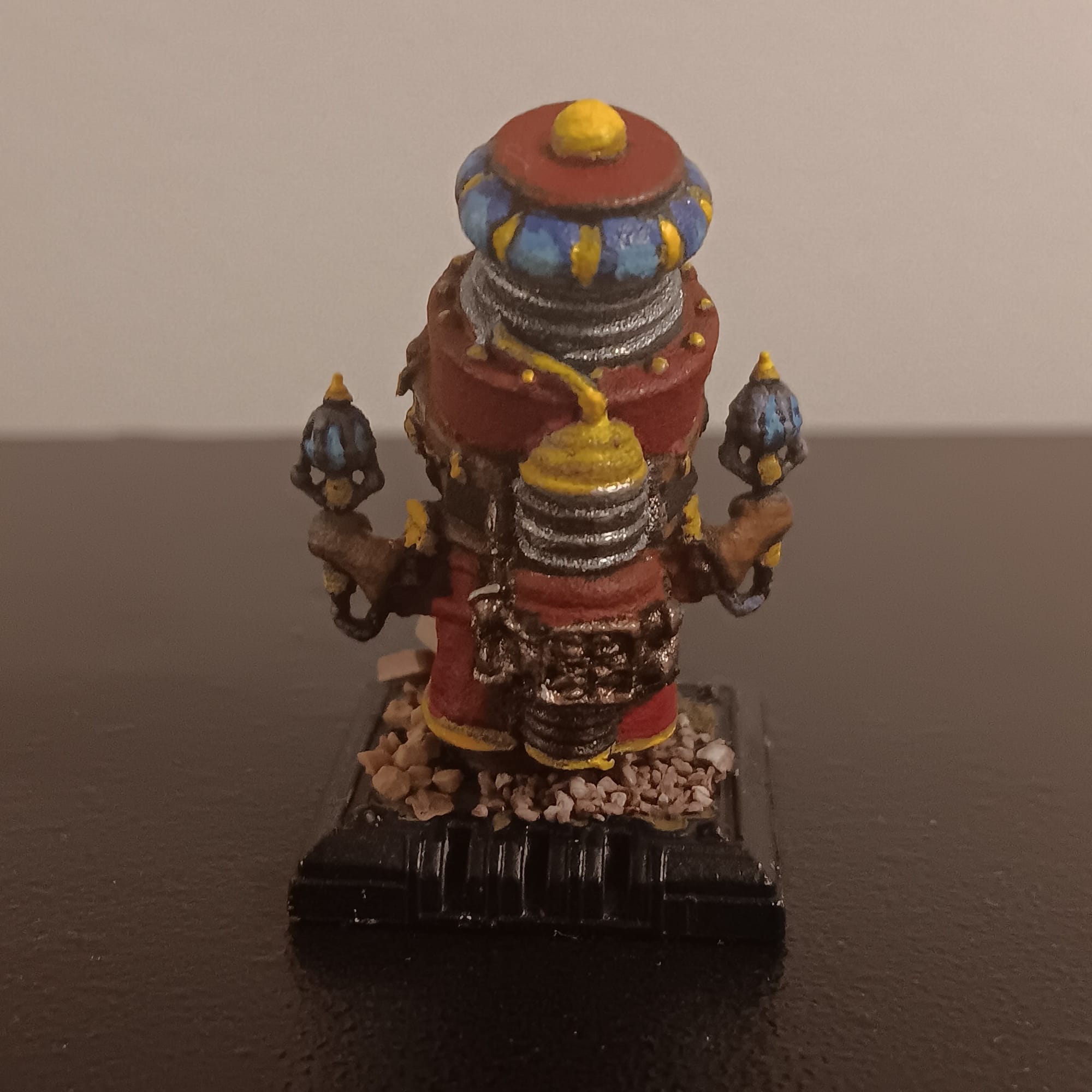
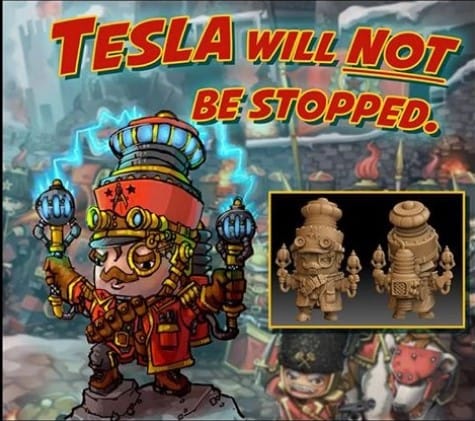
Tesla, annoyingly, was never given a stat card, although they at least released some artwork for him, so I followed that pretty closely to bring him to life. I think this is the best-looking mini of the bunch, and they did give him some neat Steampunk-y details, like his coil backpack and hat, his monocle and so on.
I imagine if they had gotten a full release, there would have also been a plug version of Tesla. As it is, if I were to game with this little army once the new Rivet Wars finally arrives, I'd have to craft some home-brewed stats for Tesla and run those stats by my opponents to make sure they're on board.
Overall though, I'm quite happy with the Ruska miniatures, even if they cost me an arm and a leg and are now, sadly, defunct. They represent a tantalizing "what might have been" for Rivet Wars.
Rantables
Lies, damned lies, and the Crime Severity Index
Among the broader election chatter in both the States and Canada, as we gear up for what promises to be some of the ugliest political spats in history, there is a recurring theme to address in particular: how we need to be "tough on crime."
In Canada, the people behind this type of messaging will usually latch onto our Crime Severity Index (CSI) statistics as their consistent proof of a country in chaos. Yet with these graphs (which are of dubious usage, given their reliance on reporting from policing bodies which have political impetus to over-emphasize crime as a means to increasing their perpetually growing salaries and budgets, and their poor representation of community dynamics in places like Victoria, which functionally is a downtown core of a larger city but which is represented in CSI as its own municipality, and therefore has worse stats), even the most inflammatory columnists must begrudgingly confess that the Index is, despite a rise from 2013, nowhere near the highest reported levels of the late 1990s.
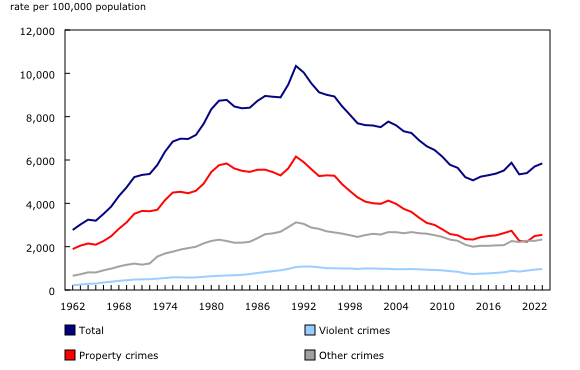
Indeed, the chief flaw is that the data only goes back to 1998, less than 30 years ago, and the CSI was invented in 2009 — during the Harper era. For people who routinely complain that "we've only been measuring global temperatures since 1880," they sure seem happy to put forward police stats as hard science despite a much-shorter time frame for their use.
And for that matter, treating police data collection as gospel is problematic as well. The loose definition of "violent crime" has evolved over time, for instance. In 2015 (Harper's last year as PM and during his Hail Mary play for another election win), it was expanded to include such minor offences as "uttering threats," "extortion," "criminal harassment" and "threatening or harassing phone calls."
In fact, looking at the 2023 stats, which are now being cited by right-wing politicians as evidence of Canada's descent into The Purge, Statistics Canada makes it clear that we are seeing lower rates of the most severe types of violent crime, and the rise in that category is instead attributable to these new definitions:
The Violent CSI remained virtually unchanged (+0.4%) in 2023, following a 13% cumulative increase over the previous two years. Compared with 2022, the Violent CSI recorded lower rates of homicide (-14%) and sexual violations against children (-10%) in 2023. The Violent CSI also recorded higher rates of extortion (+35%), robbery (+4%) and assault committed with a weapon or causing bodily harm (+7%).
What's especially absurd is the lumping together of these more minor offences with a complex, multifaceted issue like child exploitation, which can involve intersectional issues of class, race, and gender, to say nothing of complexities involving immigration and sex trafficking. But that's precisely what the CSI does.

"Sexual offences against children" became part of "violent crime" in 2015, and in the 2023 statistics, that sub-category was, in Statistics Canada's words, "the largest contributor to the change in overall Crime Severity Index in 2023." Within this sub-category, the proliferation of child pornography on the internet is a main cause for the rise in incidents. That is hardly something for which it makes sense to increase penalties, as the common right-wing refrain says, on drug offenders and the homeless.
When confronted with these facts, proponents of "tough on crime" policies will generally play to emotion, complaining that factual challenges to the CSI are prevarications that downplay the issue or are "coddling criminals." But indeed, picking at the surface stats of the CSI are the only way to meaningfully address them at all.
Over a decade ago, before he was Prime Minister, Justin Trudeau was pilloried by the media and politicians for having the gall to suggest we examine "the root causes of terrorism." It was treated as a gaff, but frankly, it was the most honest, detached assessment of a real problem the Canadian public had heard in a long while from any politician: that terrorism is a symptom, not an issue in of itself, and tackling it meaningfully involves confronting how an extremist came to be in the first place. So it is with meaningfully confronting the root causes of crime.
When we lump all crimes together into broad categories, such as child exploitation alongside extortion, we might as well admit we are making all crimes into nails and all cops into hammers. It is foolish on its face, for instance, to think a rise in child exploitation represents a need in more uniformed officers on the street. But that seems to be the answer every time: more cops, more jail time, less rights.
Ultimately, in its current form, statistics like the CSI are nothing more than a self-perpetuating political tool, providing cover for a suite of so-called "policies" that are pablum and smoke and mirrors, distracting us as a society from addressing — I will say it again — root causes.
We can do better.
And Lastly, a Word
The worthier lesson: how Harry Potter is the book series we keep praising, but A Series of Unfortunate Events was the book series we needed
"...parts."
- Beatrice Beaudelaire and Lemony Snicket, A Series of Unfortunate Events
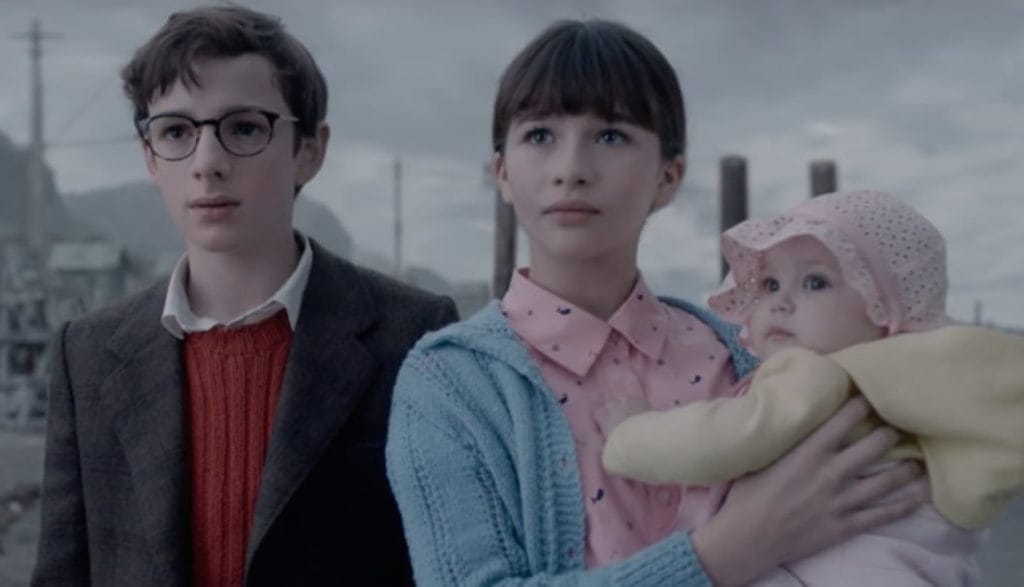
To say that J.K. Rowling's Harry Potter series was generation-defining for millennials is perhaps an understatement. We see its reach in our collective ability to say, over 10 years since the last book, if we are a Syltherin, Gryffindor, Hufflepuff or Ravenclaw.
Ask someone if they're a Volunteer or a Villain, however, and you're more likely to be greeted with a blank stare.
Those less-iconic terms are from A Series of Unfortunate Events, which was adapted on Netflix with Neil Patrick Harris from 2017-2019. But even with this more-recent injection of fame to Daniel Handler's books, A Series of Unfortunate Events has never captured the same fan craze and collective imagination of a generation. In pure sales terms, Rowling's books have outsold Handler ten to one, with over 500 million sales to Harry Potter, and 50 million to A Series of Unfortunate Events.
Yet in emotionally processing recent global crises, A Series of Unfortunate Events was the series that would have taught us how to prepare, not the Harry Potter series.
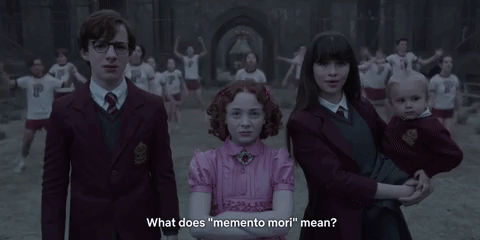
We see a lot of common ground between Rowling and Handler's works: orphan protagonists, patronizing adult characters, a recurring antagonist who is tied to the death of the parents. But from there the paths diverge, not just in genre but in theme, tone, and perhaps most importantly plot arc.
Harry Potter is a chosen one narrative (Harry is even literally called "the chosen one"). He is pulled out of a mediocre life by a magical stranger who tells him he is the most important person in the world, and, for all that he may be an active protagonist, he ultimately defeats his enemies simply by being special.
The allure of that narrative was the thought that maybe we, too, could be special, whisked away to a magical wizarding school, told we belong in this or that house.
A Series of Unfortunate Events reads like a narrative about three children who lead an utterly miserable existence, pursue clues relentlessly, but are ultimately rewarded with little to no answers and an uncertain future.
To a child's mind, that isn't very appealing. Reviews from 2006 were critical of Handler leaving so many mysteries unsolved. The BBC wrote "And you'd hope that after reading 13 books all the loose ends of the plot would be tied up nice and tight, but of course, in a frustrating way, they're not."
It's only in retrospect, with the experience of age, that we see what Handler was trying to teach us: sometimes bad things happen for no good reason.
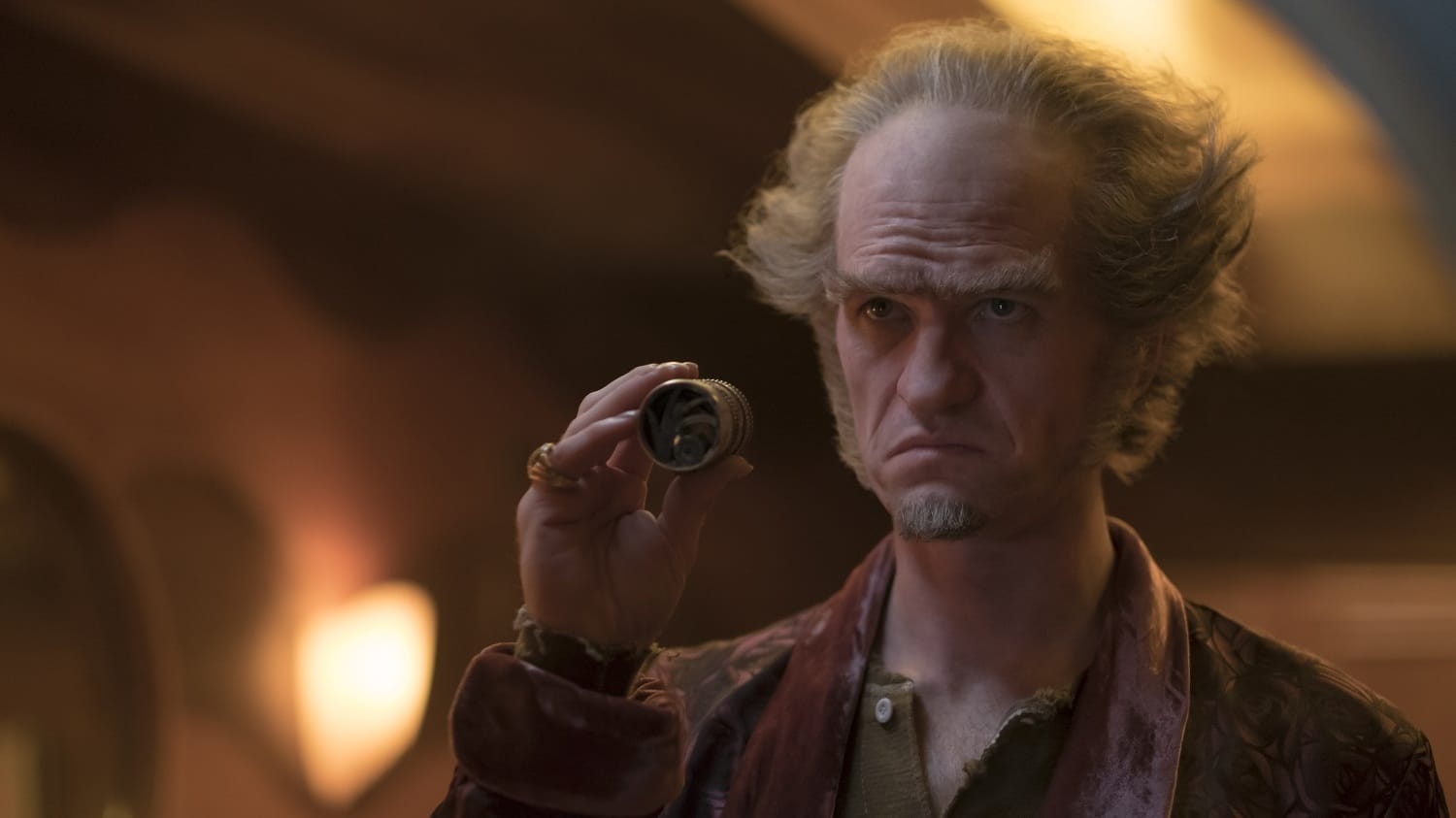
That's a tough pill to swallow. But with the fleshed out backstory provided by the Netflix show we can better appreciate the bitter medicine.
The advantage the TV series has is that it presents Lemony Snickett as a character, not just as a narrator. In the book series, we read from his perspective and take what he says as the truth. But in the TV show, after Snickett's recounting has ended, we go a step beyond and pull back the curtain. In the last moments of the TV series, Lemony Snickett is himself called away to listen to a story, rather than to tell one, and we understand: Snickett is an unreliable narrator.
Snickett's part in A Series of Unfortunate Events is to show us a person going through a grieving process. The dedications of each book, "to Beatrice," are an indicator of this loss, but in the TV show, we realize that in his grief Snickett has coloured audience perceptions of his story. He is singularly focused on unraveling the mystery, and in his own misery, he seeks out misery. His search for the fate of the Beaudelaires isn't about them, it's about him trying to process Beatrice's death.
This is a common part of grief for anyone who loses a loved one. We seek out answers. We seek out people to blame.
But Handler's books tell us that sometimes there just isn't an answer.
The TV series offers a balm to that doomsayer outlook: where the book series presented a number of "uncertain" outcomes as bleak - the Quagmire triplets drowned, the people in the Hotel Denouement possibly burned to death - the TV series offers that they could just as easily be hopeful - Fernald and Fiona reunited with their stepfather, Olaf's henchpeople performing on stage. "Not knowing" is as much a possibility for hope as it is for despair.

This is not an argument against seekers of knowledge or healthy skepticism - Handler praises the Beaudelaire's "fine qualities," including their curiosity and ingenuity. But it's where skepticism turns into obsession that toxic behaviour can follow. The Beaudelaires experience this when they betray Hal, a Librarian who treats them with kindness in "The Hostile Hospital:"
"I might pause for a moment and tell you about something I did many years ago that still troubles me. It was a necessary thing to do, but it was not a nice thing, and even now, I get a small quiver of shame in my stomach whenever I remember it...The Baudelaire orphans were experiencing similar quivers that afternoon, as they finished up the day's work in the Library of Records."
Convincing themselves that hurting Hal is necessary lets the Beaudelaires pursue their obsessive quest, but it doesn't solve their problems.
That's a lesson that we are suffering through now, rocked by irrevocable changes like the COVID-19 pandemic and climate change. In our collective grief, people are turning to the mistaken belief that there must have been a plan, a design... A conspiracy. That's dangerous.
Uncertainty is terrifying. It's why books like Harry Potter that offered all the answers were comforting. But with books like A Series of Unfortunate Events, we can be grow to confront uncertainty head-on.
A Series of Unfortunate Events teaches us that true knowledge and growth comes from accepting that sometimes, we aren't in control. And that doesn't have to be The End.
That wraps up the fourth issue of The Lagrange Point! If you enjoyed this little e-newsletter, please consider subscribing, or, if you're already subscribed, sharing it with a friend or family member!
I can't grow this e-newsletter alone. I need lots of mouths spreading lots of words about why people should read The Lagrange Point.
Until next Monday, thank you for reading!
-Tim


